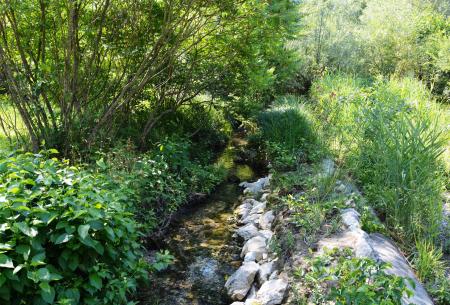
Resource description:
Guidelines for the development of a flood retention reservoir fostering water quality, biodiversity, local amenity value & environmental education.
Author/Contact:
TURAS
Expert contact: Tjaša Griessler Bulc
Requirements:
- The development of a cross-sectorial approach it is crucial to engage key stakeholders such as municipalities, water authorities, landowners, local people, tourist agencies, schools, or faculties, to provide the diverse but necessary knowledge for a colla
- See - 'Who should be involved?' (additional information)
Advantages:
- The implementation of appropriate maintenance measures can contribute to improving both flood retention capacity and water pollution mitigation and therefore, mitigate side effects of urbanisation. This includes measures such as the re-arrangement of floo
- Furthermore, local communities can be benefited through the incorporation of more open green spaces, better local microclimatic conditions, social and educational activities, carefully planned and innovatively designed recreational and educational paths.
- Main outcome: physical improvements and community empowerment.
Constraints:
- In addition to their primary water-retention function, existing flood retention reservoirs often provide just a narrow set of ecosystem services due to most of their potential benefits are neglected and thus, the synergetic opportunities they could offer
Uses of this resource:
In the last 10 years, legislation on natural disasters has mainly focused on the development and implementation of reactive measures such as reparation, re-building, or compensation. However, too little attention has been given to proactive measures such as flood prevention. This policy, exacerbated through poor flood risk management and urbanisation of periodically flooded areas, caused that flood retention reservoirs often lacked of appropriate maintenance and operational permits, do rarely offer multi-functional benefits, and generally lack creativity and foresight in terms of implementation.
Additional information:
WHO SHOULD BE INVOLVED?
FACILITATORY (PUBLIC) BODIES:
green spaces department; land use planning department; planning and development department; community development department; water and sewerage management department; environmental and sustainability department
LOCAL TASK FORCE:
local or regional authority; researcher; community group; educational organisation; landowner; business
SUITABLE FOR:
urban region; (sub-)urban communities
MAIN NECESSARY RESOURCES ARE:
community trust; space; public institutional set-up; local knowledge; expert knowledge
Licence:
- Free, no licence
Development stage:
- Full, working product